There is still war in Europe and Ukrainians have adapted the best they can. But what about studying under the shadow of war? – An interview with a Ukrainian student.
Three years. Or, to be more precise, eleven. The war in Europe, in Ukraine, continues. A country and a people fighting for their survival, defending their sovereignty, democracy and freedom. Despite the increasingly turbulent times with the Russian-friendly administration in the USA, daily life for Ukrainians goes on. Of course, it is in some way different from what we are used to. Living in peace and one of the safest countries of the world, we cannot imagine what it is like to live and study during times of war.
Tanya is a student at Oles Honchar National University studying physio- and ergotherapy. She lives and learns in Dnipro – one of the largest cities of Ukraine, located in the center-east part of the country on the banks of the river, with which the city shares its name.
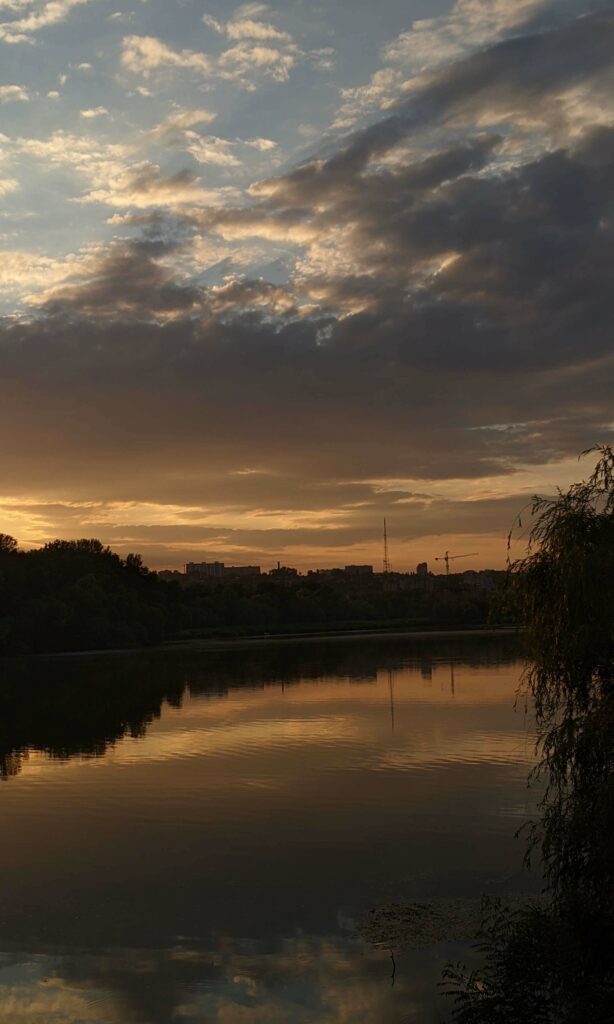
What is Dnipro like?
„Dnipro is a city of contrast where modern buildings fit into old architecture. Where there are beautiful parks and the longest embankment in Europe. Where new residential buildings coexist with old Soviet houses. There are tourist places, picturesque, where the eyes rejoice and the soul rests. But there are also unattractive areas, saturated with post-Soviet culture. But, for the most part, Dnipro is a beautiful place. I would not say that it is among the top places to visit in life, but there is something special about it.“
Is there anything you particularly like about your hometown?
„What do I like? I like the Dnipro, the river. My entire childhood was spent near this place. We walked with my father on the ice of this river in winter, with the dog along the embankment at any time of the year. If I may say so, my favourite place in Dnipro is Dnipro.“
What is your daily routine as a student like?
„My student routine is not at all the one you are used to. I usually wake up ten minutes before class, drink water and go to an online lecture or practice. There can be from one to five such classes a day and all are online. […] Between classes I usually have breakfast and lunch. Sometimes I do assignments right away during classes or after them.“
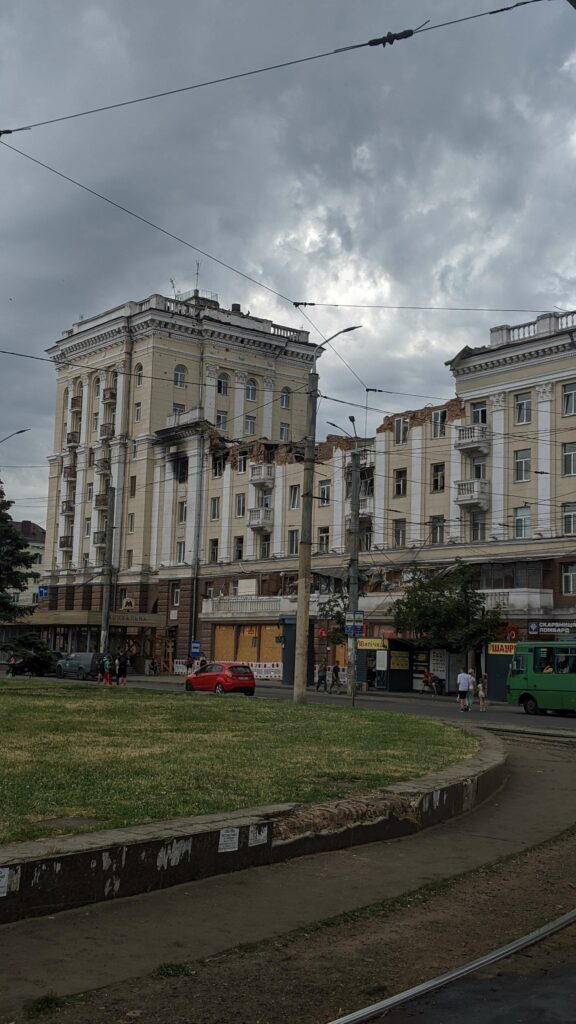
What is the war’s effect on your uni life?
„Oh, and here comes the sadness … my university works completely online because there is no bomb shelter. And this, I will say, is so-so. I cannot compare what is now with what it was before the war, because I entered when the war began. But all three years I have been studying online and there were practically no offline classes. […] There is also a problem with teachers, but this is not the case with everyone. There is not enough of what the university provides and I feel that more knowledge is needed in order to work in this field later. It is sad to say, but studying completely online is terrible, truly terrible. It is hard to describe.“
What is the issue regarding the teachers?
„Some teachers are not doing their job. They treat their work as frivolously as some students treat their studies. On the one hand, it is difficult to teach online what you need to see with your own eyes. On the other hand, university needs to take measures to change the situation.“
What signs of change did you notice in Dnipro after the beginning of the war and during the past three years?
„There are enough buildings destroyed by missiles in Dnipro for every city resident to have seen it at least once in their life. At first, the changes were more significant: fear, ignorance, panic. But now they have practically disappeared. People have gotten used to it. Every day an air raid siren sounds several times – a harbinger of danger. But people usually do not react to it at all. What has changed since the beginning of the war is that we have [Telegram groups and apps] that allow us to track which area of the region is currently dangerous and what kind of weapons are attacking.“
How did the war affect you?
„I did not have a graduation, I had to finish school somehow. The exam that was supposed to be after school was changed and I had to relearn […], because of which my results were lower than expected. In fact, at the moment there is practically no effect. Some stores and establishments do not work when the alarms sound, but this is minimal discomfort. Often you have to adjust your day to the war, but everyone has long been accustomed to this. – I do not feel afraid, I just want it all to finally end.“
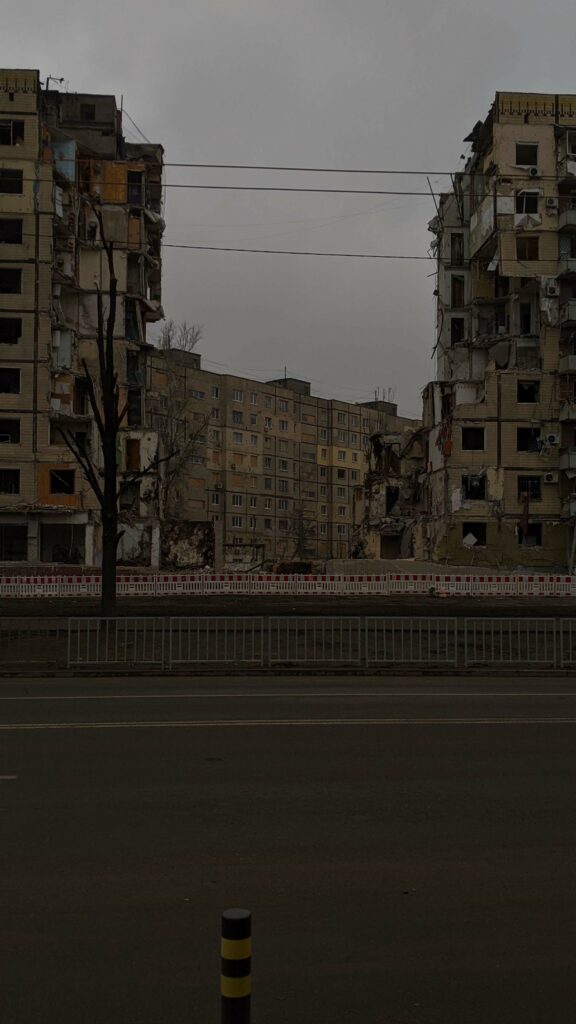
How do you want it to end? Do you have any wishes or expectations?
„Have you seen the latest news? I do not think there can be any talk about wishes or expectations … I hope not to die and I do not want my country, at least some part of it, to become Russia. I do not want people to die. I do not want [the Russians] to sell apartments in our destroyed cities, from which our people fled, to residents of Russia. […]“
Is there a story you want to share?
“January 14, 2023. A house located five minutes walk from my parents’ house. […] The explosion occurred at half past three in the afternoon. Nothing foreshadowed trouble, but I will always remember how the earth shook. How photos began to appear on the news. And over time the realisation came – which house was hit. I immediately realised that the place was very familiar, and by the loudness of the explosion it was clear – it was very close. A little later, videos began to appear on the Internet where people under the rubble screamed from helplessness, some of them will never see the light of day again. Some died immediately, others froze to death. Among the people living there were my acquaintances: a boy from a parallel class, he was supposed to leave the house in ten minutes to meet his mother from work, but did not have time; my former fitness trainer went for a walk outside with her children, her husband stayed at home and died; my godfather’s friends – Mother, daughter, stepfather – lived there. They sent their daughter to her grandmother for some time, agreed to take her back home that day. Mum had a headache, she really did not want to go, but her husband persuaded her, saying that they promised to take Sonya (the girl). They went and miraculously escaped death – the girl did not become an orphan. Only the cat died. A little later, while walking the dog, I saw a woman. The mother of one of the dead girls – I knew this girl from music school, we went to the same choir – I saw how empty her eyes were. This woman was walking her friend and her child, cursing herself in her head for not being able to save her daughter.”
Interview and translation: Johannes Wingert
Photos: Tanya
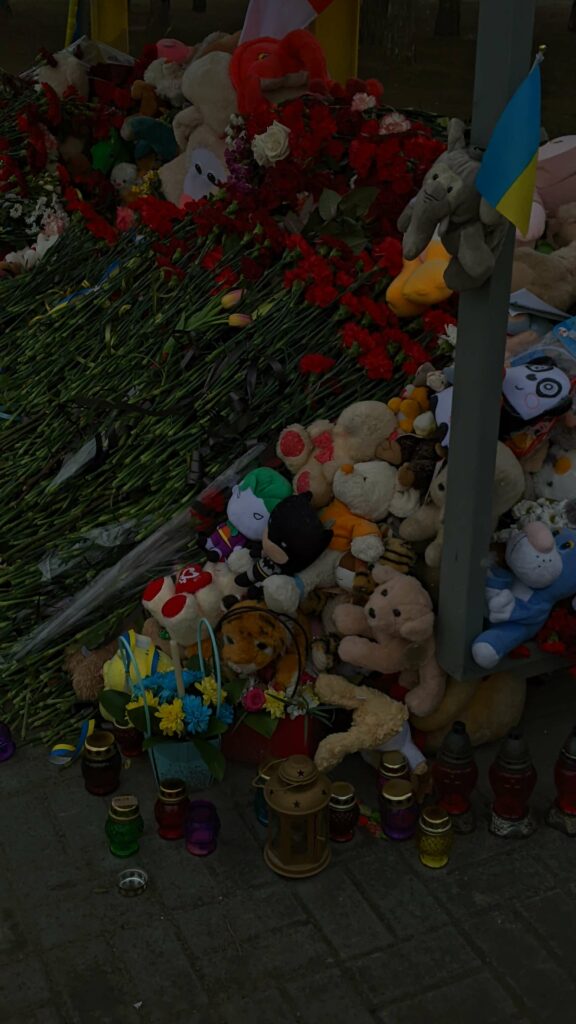
Comment: Why it is important not to forget.
I still remember when the war started. I was on my way home from my internship and walked towards the tram at the Weinberg Campus. What did I notice? The Ukrainian flag was waving in the wind next to the other flags – a sign of solidarity. The flag has long since disappeared from there. Out of sight, out of mind.
The war in Ukraine has been going on for three years now and, to be honest, there is no end in sight. Gone are the days of false euphoria that I felt when large parts of Kharkiv and finally Kherson were liberated by Ukrainian troops in 2023. Since then, there have been no major gains on either side. Only a very slow advance by the Russian army, which in the 21st century still resorts to tactics from the Second World War and wants to decide assaults with sheer numbers. The entire extent of the war is sick. War is always sick, but in this case, it is even more perverse to see how the Russian propaganda machine in Germany and now prominently in the USA is bearing fruit – twisting the perpetrators and the victims.
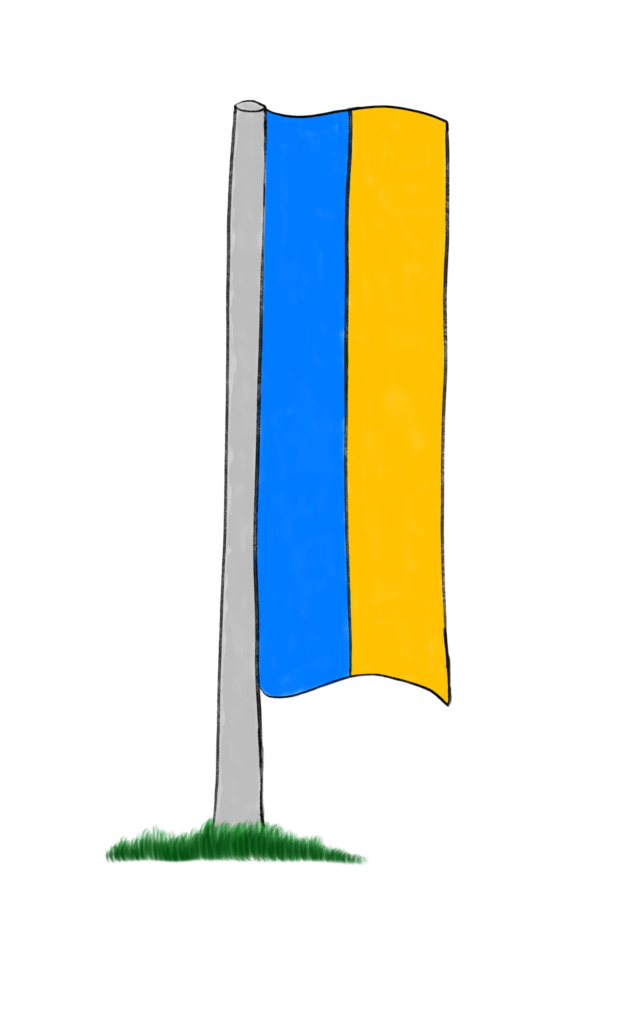
No one should forget who attacked whom here. Russia, under the leadership of Putin, attacked its neighbour out of pure imperialist megalomania. Russia is responsible for missile strikes on schools, kindergartens and hospitals. Russia deported tens of thousands of Ukrainian children in order to impose a Russian identity – an ideology – on them, so that it could later send them to the front lines too. And Russia committed unspeakable cruelties in Bucha and elsewhere. But in Germany we already have our own problems with forgetting.
In the media the Ukraine topic has become secondary, unless there are performances like those made by US President Trump and his Vice President Vance. Why is that? Probably because news is increasingly just trying to get our attention. Repeating the same thing over and over again just does not get as many clicks. In addition, support from the self-proclaimed free world has been rather hesitant since the beginning of the war of aggression. There has been much talk about the importance of standing by Ukraine’s side, but no action has followed. From the very beginning, and still today, it is the Ukrainians who are fighting and also dying for that free world. The fact is that more should have been done to support Ukraine, be it purely humanitarian or militarily. We should not forget that what is happening in Ukraine right now and how it will all turn out will shape the coming world order and the future of Europe, and therefore concerns us all. Ultimately, this burden rests on the people of Ukraine.
slava ukraini
Comment: Johannes Wingert
